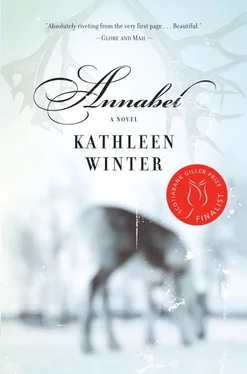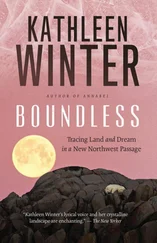Thomasina was no whitecoat; she was a fierce grey and silver grown-up who had held her entire self in reserve for a day such as this. Jacinta she felt, lay somewhere between those other women and herself: self-containment was half-formed in Jacinta; she had depths of judgement to which she could turn but did not fully trust them. She had surrendered part but not all of herself to the wisdom of her husband. Jacinta, Thomasina felt, would never be wholly at ease with any decision about which she and Treadway had differing ideas. Thomasina and Graham had married late. Perhaps that was why each never thought to question the judgement of the other. Thomasina had never questioned Graham’s blind hunting or his taking Annabel out in the white canoe or any other boat, and he had not questioned Thomasina when she went on her own journeys alone or with Annabel into the interior, which no other white women did. Danger faced Graham and Thomasina and their child equally at every turn, as did discovery, and this was something each faced for himself or herself. In her misfortune, Thomasina did not blame Graham.
None of the townspeople knew the extent of Thomasina’s grieving because she did not fall apart in front of them. Nor did she fall apart alone in her house. She sat on the daybed under a small window that looked over the backyard and the inlet and stared for half an hour the morning after the drowning of Graham and Annabel, and she did the same that evening, and the next morning as well. She sat on the daybed because that spot was an in-between place, not a living room or kitchen where scenes of family life had played out. This was a passage in which everyone moved and was unfathomable, which was how Thomasina saw people. She was not a person who froze someone’s character in her mind, calling this one egotistical and that one not nearly confident enough and another one truthful or untruthful. To Thomasina people were rivers, always ready to move from one state of being into another. It was not fair, she felt, to treat people as if they were finished beings. Everyone was always becoming and unbecoming. It was unbearable to her that she had lost Annabel and Graham, but she had borne unbearable things, and she knew how to keep going. She had her own way of saying goodbye to her lost beloved, and she said it in private. Then she went about the business of being around for those who were living. Especially, she decided, for that little baby of Jacinta’s, Wayne, whom no one wanted to call a daughter.
JACINTA LEFT PILOT OBED WILSON on the tarmac and walked in the hospital entrance as if she were taking her child for a routine weighing and measuring with the public health nurse. She walked down the first-floor corridor to the back exit, saw it would not open without setting off an alarm, walked to a side entrance where the cafeteria workers went to have their smoke breaks, opened that door, which faced a deserted lot full of expired thistle and St. John’s wort, and ran. She ran to the chain-link fence that surrounded the hospital and stopped when she got to its interlocking wire, which rose eight feet, as if women were always trying to escape with their babies. Beyond the fence was a ditch, then waste ground: rubble and corrugated pipes where men had dug to lay a new drainage system around the hospital. There were errant snowflakes, and no colour save for brown, white, grey, and a green so dark it might as well have been black. In the woods, Jacinta knew, if she managed to find a way around the fence, she would find Innu tents, fragrant with boughs and woodsmoke and steam swirling from sugared tea, the men hunting and the women plucking geese and digging firepits to singe the pinfeathers. Grandfathers rested on their bough beds and the children played outdoors with duck and goose bills and bones and claws, making puppets out of whatever parts of the bird did not get eaten. Once Jacinta had wandered into a camp like this when she was berry picking, and there had been a mother and small baby in one tent, and that baby had had something wrong with him.
He had been born with a genetic anomaly but his mother had held him and sung to him, a lullaby in Innu-aimun, and no one had tried to take that baby to the Goose Bay General Hospital and maim him or administer some kind of death by surgery. No one had found fault with him at all. His family had cared for him as he had been born. The encampment had been at Mud Lake, where a little schoolhouse stood for the children and you could go only by helicopter in spring because the ice was too thick for boats but too thin for sleds. Jacinta had canoed to the place and had felt afraid of its isolation but comforted by its womb-like softness and enclosure. But she had gone in berry season: a warm, golden day when the sun from the whole summer remained, soaked into every berry and leaf. You could get the wrong idea about a place in the fall, before the snow. You could get the idea that it would always welcome you. If Jacinta found her way back there now, frost lying in the seams of the land, who would welcome her? The Innu had given her tea and bread that day, but she would need more than that now.
Jacinta had always been a person prone to bolting, strongly tempted to escape when overwhelmed. She imagined herself running to the desert of New Mexico and finding an uninhabited dwelling. She imagined going back to St. John’s and living in a tiny bed-sitter and cooking a mash of oats and sweet carrots for her baby. But she was thirty-four, not twenty, and knew that beyond the romance of an escape, beyond the first euphoric flight, there was a second day that brought a return of ordinary burdens, the burdens you thought you had fled. Now, with her baby, she stood at the chain-link fence and hated that there was no opening, no place for her and her baby to run. She sat on the ground and picked pieces of lambkill and made them into the kind of tiny corsage she had made of clover in her childhood. She kissed her baby’s head and sang to him the same Innu lullaby she had heard in the tent. At least that little baby and her own would hear the same song.
At a window of the hospital, on the third floor, stood a blur, a nurse looking out. Jacinta heard Obed Wilson’s helicopter lift off and fade. If that nurse hadn’t noticed Jacinta she could have sat on the ground until hell froze over and no one would have known where she or her baby had gone. The lullaby had the kind of tune everyone thinks they’ve heard before but can’t remember where. A tune like that floats in the air all the time and now and then you catch it.
“You like the tune, baby?” Jacinta kissed Wayne’s nose. He looked at her and trusted her with his black eyes that were changing into another colour. “Nothing about you is the way it’s going to be,” Jacinta told him. “Nothing about you will stay the same.” The nurse came out the exit Jacinta had found. She was short, with black hair, around thirty. She stepped over the mud and snow seams and thistles in her white shoes pricked with a hundred breathing holes.
“Are you all right?”
Jacinta looked only at her baby.
“I’m Tana. Are you here for her three-month needle?”
“No.”
“Are you okay? Do you want me to take her? Do you want to come in for a cup of coffee while we get her signed in?”
Jacinta got up and walked with Tana away from the chain-link fence, away from the land that had nothing on it but weeds and stones and drainage pipes. It was not beautiful, but it had space and an undefined air. Everyone was trying to define everything so carefully, Jacinta felt; they wanted to annihilate all questions. As they got close to the door she felt the walls of the hospital lean forward and close in, and she stopped.
“What are you here for today?” Tana asked. She sounded as if she had to come out onto this waste ground every day and round up bolting mothers. “What’s your name? Which doctor do you have to see?”
Читать дальше












